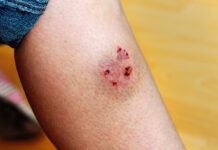Why does my dog excessively lick everything, including the floor and the air? How can I stop this excessive licking? It’s constant.
The answer depends upon why your dog may be licking, which means you need to pay attention to when he licks, where he licks, and how he reacts. If the licking is not truly obsessive, it might just be his way of exploring the world, and that’s OK.
Licking Due to Pain
If it’s truly constant licking, the dog is probably dealing with pain or an injury. Painful areas that get licked tend to be joints, which means hips, stifles, and carpus (wrist). A trip to the veterinarian is wise to determine if there’s an injury, arthritis, or other cause and what the best treatment may be.
If he is licking his feet or groin or nails, your veterinarian will check for possible yeast infections. And, if his licking is more like chewing, then parasites such as fleas are most likely the cause.
No matter how you turn this, the dog is licking because he doesn’t feel well, and the way to stop it is proper veterinary treatment.
While we associate licking haircoats with cats, some dogs, especially those with short, tight coats, lick as part of their self-grooming habits, relieving uncomfortable mats or spots. If this is constant, an appointment with a dog groomer may be in order.
Licking Other Dogs
Dogs will often lick other dogs, especially ears, which may indicate an infection that needs treatment in the dog being licked.
Puppies and young dogs will often lick the mouths of other dogs. There are two strong possibilities for this:
- In the wild, this would stimulate the adult to regurgitate food for the puppies.
- Licking other dogs can also be a submissive behavior or be an expression of anxiety.
Licking, including licking you, also may be a sign of affection.
Licking and Scent
Since dogs rely heavily on their sense of smell to learn about the world around them, licking seemingly weird things makes sense. Licking moves scent molecules into the body. The vomeronasal organ, which handles the dog’s sense of smell, is located on the hard palate (roof of the mouth), so licking brings that scent right to the perfect spot.
A dog licking the floor is most likely picking up faint odors of food, cells from where a person or another animal has walked, and any number of fascinating smells that have drifted onto your floor or carpet.
Search-and-rescue dogs as well as tracking dogs will often mouth or lick the “scent object” provided to them as they start work. These dogs also often sniff or lick the air to detect subtle odors. You have probably noticed your dog “air sniffing.” For a working dog, that could lead them to a lost child, for your pet, however, he’s probably heading for the neighbor’s cookout and a free hot dog.
How to Stop Licking
Stopping excessive body licking can be difficult, but it needs to be done. Dogs who have licked enough can cause a nasty wound, called a lick granuloma, that may require antibiotics, anti-inflammatories, a physical barrier such as an Elizabethan collar, anti-anxiety medications, or even surgery in drastic cases.
Let Your Dog Be a Dog
Allow your dog to naturally lick to smell things, learn about the world around him, and simply enjoy the varied scents in the world. That type of lick-associated exploration shouldn’t be obsessive enough to bother you, but if it is, then the help of a certified fear-free trainer or veterinary behaviorist may help you rule out some type of anxiety causing the dog to obsessively lick.







I had a preowned German shepherd who was 2 years old when I brought him into my life. I called him my lemon dog — one thing after another, something was always (medically) wrong with him. And he was a behavioral mess, too. No doubt a combination of not feeling well from medical issues and a lack of any training. And, he likely didn’t get much attention from previous owner(s) because he was so difficult to be around. Chronic diarrhea was just one piece of that.
Phoenix had very serious allergies. It wasn’t until I started taking him to a veterinary dermatologist that he started to improve (on all levels). The chronic diarrhea (from Day 1, for the first two months I had him) was resolved when the internal medicine specialist put him on hydrolyzed protein diet. I learned then: if a primary care vet can’t resolve the problem, don’t waste any more time: Take him to a specialist.
But Phoenix would chronically lick. Not just himself or me but floors, walls, my pants, carpets, sheets — almost everything. Every vet (including specialists) I spoke with about this behavior chalked it up to him being a pretty nutty dog. It was a behavioral problem — perhaps with a dash of OCD — they all said.
And then I noticed one night after he had eaten that he lay down, with his head up, neck fully extended and smacked his lips. He’d done this before. Always within about a half hour after he had eaten. I had stumbled on something on the web earier and now I went back to consult with Dr. Google.
Sure enough, all that licking — especially the extended neck and lip smacking — were all symptoms of gastric upset. I had him seen by an internal medicine specialist who did extensive tests. Diagnosis: acid reflux.
As per the vet, I started giving him Prilosec. It seemed to be helping, but three weeks after that vet visit, Phoenix died — of hemangiosarcoma. Phoenix was only 5 1/2 years old when he died.
But gastric upset should definitely be ruled out if there’s constant licking that has nothing to do with pain or allergies. I read a study that was done in the U.K. that tied extreme allergies with behavioral problems in dogs. And here I had always thought it was just a wild theory of mine.
My experience has been that there are many behavioral issues that are rooted in medical problems. Fix the physical problem and then work on extinguishing learned habits. Can you imagine feeling itchy all the time? No wonder Phoenix had such a problem with focus and impulse control. Once the chronic itch was gone, he started to come around behaviorally. But then he died. Not a doubt in my mind that he had been a puppy mill puppy. His gene pool was more like a cesspool.